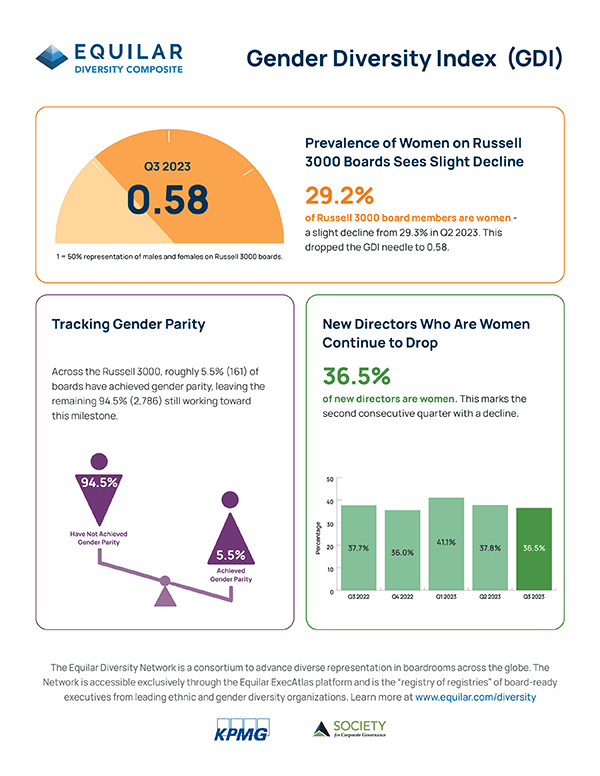Q3 2023 Equilar Gender Diversity Index
Percentage of Women on Boards Declines for First Time Since 2017
December 20, 2023
Joyce Chen
Diversity, equity and inclusion (DEI) issues have evolved from mere buzzwords to critical components shaping the current Corporate America. Nowhere is this change more significant than in the boardroom, where discussions and actions regarding DEI have gained immense traction and importance.

The journey toward complete gender parity—symbolized by a Gender Diversity Index (GDI) of 1.0—in the boardroom is an ongoing and complex process. While there has been progress in acknowledging the importance of gender diversity at the leadership level, overcoming these challenges necessitates a collective and sustained effort from individuals, corporations and policymakers. Encouraging diverse representation in the boardroom is not just about meeting a quota but about harnessing a variety of perspectives that can drive better business outcomes and contribute to a more equitable and inclusive organization.
The Q3 2023 GDI saw a slight decrease from 0.59 in Q2 to 0.58. During the quarter, the percentage of women on Russell 3000 boards declined from 29.3% to 29.2%—the first time since 2017 that this figure declined. Particularly concerning is the percentage of new female directors appointed during Q3, which hit the lowest point of the year, falling from 41.1% in Q1 to 36.5%. The third quarter saw a 1.3 percentage point decrease from this previous quarter, dropping from 37.8% in Q2 to 36.5%. While the decline is certainly discouraging, experts argue that there may be more than meets the eye.
| Year |
Percentage |
| Q3 2022 |
37.7 |
| Q4 2022 |
36 |
| Q1 2023 |
41.1 |
| Q2 2023 |
37.8 |
| Q3 2023 |
36.5 |
“There are many possible reasons for minor changes from quarter to quarter in the percentage of women representing new directors and all directors on Russell 3000 boards,” said Susan Angele, Senior Advisor at KPMG’s Board Leadership Center. “The fact that both of these indicators are seeing tiny percentage decreases from the prior quarter may actually be a healthy sign, if it means that boards are simply becoming more diverse in all aspects, including males as well as females who are diverse by race, ethnicity, LGBTQ and other underrepresented status.”
While companies may be focusing on board diversity in other forms, recent developments may play a role in the push for gender diversity. In October 2023, a U.S. appeals court upheld Nasdaq's board diversity rule, which requires companies listed on the exchange to have women and minority directors on their boards or explain why they do not. The National Center for Public Policy Research and the Alliance for Fair Board Recruitment had requested the 5th U.S. Circuit Court of Appeals to block the rule.
Despite encountering some resistance, this rule signifies a step towards achieving gender parity and might accelerate this process beyond initial projections. “Larger companies have typically been in the forefront of board diversity disclosures, and with the advent of Nasdaq’s board diversity disclosure listing rule, standardized and accurate board demographic information, based on voluntary self-identification, is becoming more commonplace across smaller companies as well,” explained Angele. “This growing trend will continue to strengthen the foundation for research on evolving board demographics and help investors better understand the extent to which the companies in which they invest exercise strong governance through diverse and inclusive boards.”
While pressure from various stakeholders persists, several boards still do not have a female director, including 64 in Q3 2023. During the second quarter of 2023, 69 boards lacked a female director, and in the third quarter, five (7.3%) of those boards appointed a woman. The five boards represent 0.2% of the entire Russell 3000 index. Overall, 161 Russell 3000 boards have achieved gender parity as of Q3 2023—down from 161 in the previous quarter, marking the first quarter since Q1 2021 that saw a decline.
Nevertheless, optimism lies in the proactive responses and initiative that might emerge from the minor setback in this quarter’s GDI. By aligning strategies with the broader societal push for gender equality, companies have an opportunity to pivot towards more inclusive and diverse leadership, potentially driving the numbers up in the foreseeable future.
About Equilar Gender Diversity Index
The Equilar GDI reflects changes on Russell 3000 boards on a quarterly basis as cited in 8-K filings to the SEC. Most indices that track information about board diversity do so annually or even less frequently, and typically with a smaller sample size, sometimes looking back more than a full year by the time the information is published. While this data is reliable and accurate, the Equilar GDI aims to capture the influence of the increasing calls for diversity from investors and other stakeholders in real time.
The Equilar GDI is powered by Equilar ExecAtlas, a database of more than 2.5 million public company board members and executives. ExecAtlas includes exclusive features that show how board members and companies are connected to each other, as well as the Equilar Diversity Network (EDN), a “registry of registries” of board-ready executives from leading ethnic and gender diversity partnerships, organizations, and publications.
Contact

Joyce Chen
Associate Editor at Equilar
Joyce Chen, Associate Editor at Equilar, authored this post. Equilar Researchers Sinem Atalay, Ryan Cody, Yifan Ding, Jeremy Ho, Erin Le, Lucia Song, Lexie Tang, Jake Teng, Laura Wu and Heidee Xiong contributed data and analysis. Please contact Amit Batish, Senior Director of Content, at abatish@equilar.com for more information about this article.
 Solutions
Solutions












